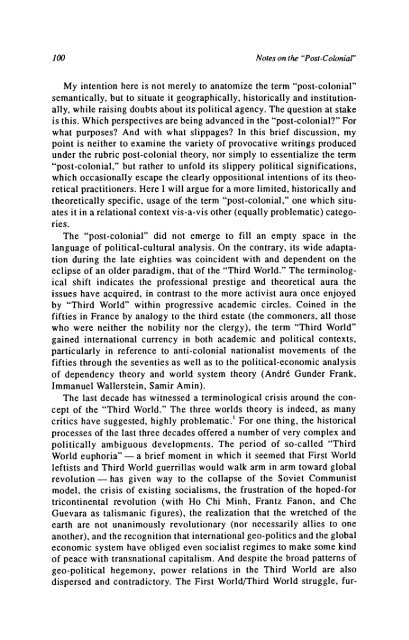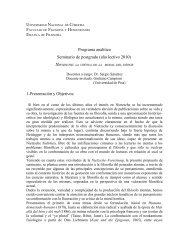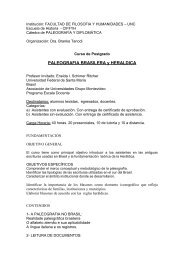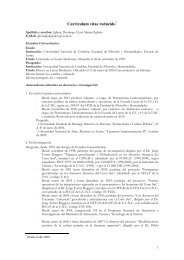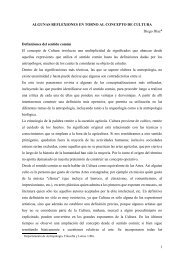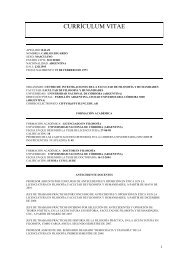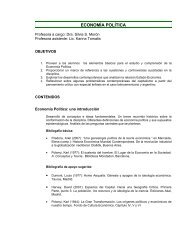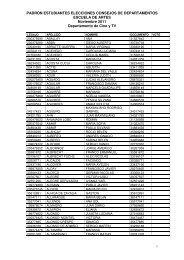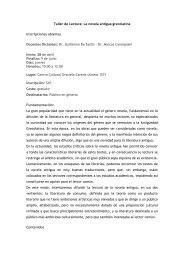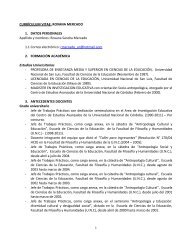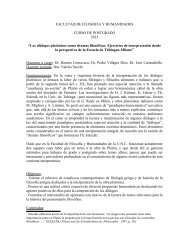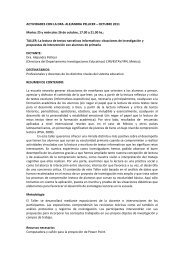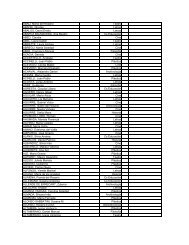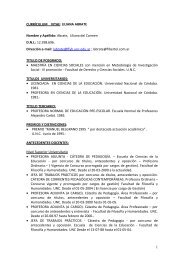Notes on the "Post-Colonial" Author(s): Ella Shohat Source: Social ...
Notes on the "Post-Colonial" Author(s): Ella Shohat Source: Social ...
Notes on the "Post-Colonial" Author(s): Ella Shohat Source: Social ...
You also want an ePaper? Increase the reach of your titles
YUMPU automatically turns print PDFs into web optimized ePapers that Google loves.
<str<strong>on</strong>g>Notes</str<strong>on</strong>g> <strong>on</strong> <strong>the</strong> "<strong>Post</strong>-Col<strong>on</strong>ial"My intenti<strong>on</strong> here is not merely to anatomize <strong>the</strong> term "post-col<strong>on</strong>ial"semantically, but to situate it geographically, historically and instituti<strong>on</strong>ally,while raising doubts about its political agency. The questi<strong>on</strong> at stakeis this. Which perspectives are being advanced in <strong>the</strong> "post-col<strong>on</strong>ial?" Forwhat purposes? And with what slippages? In this brief discussi<strong>on</strong>, mypoint is nei<strong>the</strong>r to examine <strong>the</strong> variety of provocative writings producedunder <strong>the</strong> rubric post-col<strong>on</strong>ial <strong>the</strong>ory, nor simply to essentialize <strong>the</strong> term"post-col<strong>on</strong>ial," but ra<strong>the</strong>r to unfold its slippery political significati<strong>on</strong>s,which occasi<strong>on</strong>ally escape <strong>the</strong> clearly oppositi<strong>on</strong>al intenti<strong>on</strong>s of its <strong>the</strong>oreticalpractiti<strong>on</strong>ers. Here I will argue for a more limited, historically and<strong>the</strong>oretically specific, usage of <strong>the</strong> term "post-col<strong>on</strong>ial," <strong>on</strong>e which situatesit in a relati<strong>on</strong>al c<strong>on</strong>text vis-a-vis o<strong>the</strong>r (equally problematic) categories.The "post-col<strong>on</strong>ial" did not emerge to fill an empty space in <strong>the</strong>language of political-cultural analysis. On <strong>the</strong> c<strong>on</strong>trary, its wide adaptati<strong>on</strong>during <strong>the</strong> late eighties was coincident with and dependent <strong>on</strong> <strong>the</strong>eclipse of an older paradigm, that of <strong>the</strong> "Third World." The terminologicalshift indicates <strong>the</strong> professi<strong>on</strong>al prestige and <strong>the</strong>oretical aura <strong>the</strong>issues have acquired, in c<strong>on</strong>trast to <strong>the</strong> more activist aura <strong>on</strong>ce enjoyedby "Third World" within progressive academic circles. Coined in <strong>the</strong>fifties in France by analogy to <strong>the</strong> third estate (<strong>the</strong> comm<strong>on</strong>ers, all thosewho were nei<strong>the</strong>r <strong>the</strong> nobility nor <strong>the</strong> clergy), <strong>the</strong> term "Third World"gained internati<strong>on</strong>al currency in both academic and political c<strong>on</strong>texts,particularly in reference to anti-col<strong>on</strong>ial nati<strong>on</strong>alist movements of <strong>the</strong>fifties through <strong>the</strong> seventies as well as to <strong>the</strong> political-ec<strong>on</strong>omic analysisof dependency <strong>the</strong>ory and world system <strong>the</strong>ory (Andrd Gunder Frank,Immanuel Wallerstein, Samir Amin).The last decade has witnessed a terminological crisis around <strong>the</strong> c<strong>on</strong>ceptof <strong>the</strong> "Third World." The three worlds <strong>the</strong>ory is indeed, as manycritics have suggested, highly problematic.' For <strong>on</strong>e thing, <strong>the</strong> historicalprocesses of <strong>the</strong> last three decades offered a number of very complex andpolitically ambiguous developments. The period of so-called "ThirdWorld euphoria" - a brief moment in which it seemed that First Worldleftists and Third World guerrillas would walk arm in arm toward globalrevoluti<strong>on</strong> - has given way to <strong>the</strong> collapse of <strong>the</strong> Soviet Communistmodel, <strong>the</strong> crisis of existing socialisms, <strong>the</strong> frustrati<strong>on</strong> of <strong>the</strong> hoped-fortric<strong>on</strong>tinental revoluti<strong>on</strong> (with Ho Chi Minh, Frantz Fan<strong>on</strong>, and CheGuevara as talismanic figures), <strong>the</strong> realizati<strong>on</strong> that <strong>the</strong> wretched of <strong>the</strong>earth are not unanimously revoluti<strong>on</strong>ary (nor necessarily allies to <strong>on</strong>eano<strong>the</strong>r), and <strong>the</strong> recogniti<strong>on</strong> that internati<strong>on</strong>al geo-politics and <strong>the</strong> globalec<strong>on</strong>omic system have obliged even socialist regimes to make some kindof peace with transnati<strong>on</strong>al capitalism. And despite <strong>the</strong> broad patterns ofgeo-political hegem<strong>on</strong>y, power relati<strong>on</strong>s in <strong>the</strong> Third World are alsodispersed and c<strong>on</strong>tradictory. The First World/Third World struggle, fur-


